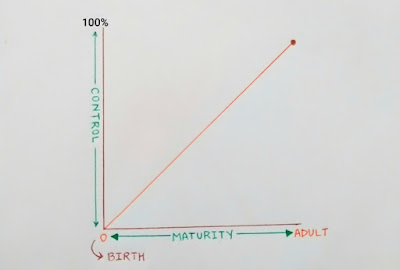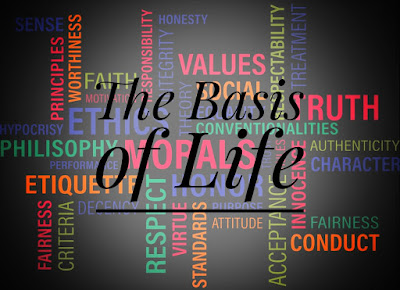How do personal values, morals and ethics influence a person's life in making good decision?
That might be obvious. There's a psychological model that'll help us to understand that. What I'm about to share with you is a model which is known as 'Nova principles program' which is taught in the U.S.A. schools by uniformed law enforcement officers to help kids make good decisions in their life. This is not just about staying away from drugs, for example. Although that's one application. This is about making morally based decisions. And it has to do with the way our mind develops morally. The model to which I'm referring starts with a graph like this (Graph 1).
 |
| Graph 1 |
The graph plots 'Control' on left side vertically. Against 'Maturity' down side horizontally. Control means control over your own life. And it goes from zero down at the bottom to 100% up here at the top. So, you can have all of the control in your life or none of the control in your life or somewhere in between. And most of us have somewhere in between. Maturity is a really interesting concept. So, as we shift to the topic of maturity, probably the most common way that we think about maturity is in terms of age. How old you are. Let's start with putting birth over 0 of the graph. When you're first born, how much control do you have over your own life? None. Well, a little you can make a big noise in a big stink. But for the most part you don't have a lot of control when you're first born. How about as an adult? How much control do you have on this end of the equation? Now, if you're an adult, you probably got a little bit of small print going on in your own mind because you're thinking, "Well there's some things that we don't really control." Yes, that is true. But when you ask teenagers, "How much control do the adults have?" What do you think they tell you? "Oh, 100%. They got all of it." Yeah. Well, let's just go with what they're saying for now. And we'll put the adult control at the top of the graph just as shown down here (Graph 2).
 |
| Graph 2 |
Near, the top atleast between birth and adulthood, we gradually increase in our control so that the more mature we are the more control we have. Now, that makes sense when we talk about age. But today, we're talking about moral reasoning which makes more sense to handle in terms of stage not age. Let's break this up into stages. So, I'm going to take age out of the equation. And instead, we'll break this up into 3 stages. And the way that I've labeled these, I think it'll be pretty easy for you to remember. Stage 1, stage 2 and stage 3. Isn't that brilliant? You can see the new graph down below (Graph 3).
 |
| Graph 3 |
These are different stages of moral development. So stage 1 is the least mature, stage 3 is the most mature. And at stage 3, you get to have the most control over your own life. Back to our title for a minute. How do personal values, morals and ethics influence a person's life in making decision? What we do depends on what stage we're on in our own moral development.
People who are at stage 1 :
They tend to be very selfish, very self-centered. It's all about me, me, me. Their whole world just revolve around them, they also tend to be demanding and manipulative and they tend to throw a little fits and temper, tantrums. Now, 2-years-old can do this right? But so can 35-years old. How much maturity does it take to throw tantrum? That's what stage one is all about.
Stage 2 :
We stop fighting and start cooperating. People who are willing to cooperate. You know, negotiate. Work things out, come up with a win-win kind of a solution. Well, that's a whole lot easier to deal with. These people get to have more control in their life.
Stage 3 :
This is where we are truly responsible. And now, our decisions are driven by morals and values and ethics. So, here's how it ties back into our title for today. When you're on stage 1, you might do the right things occasionally. But the reasons you do those right things is because there's something in it for you or you're going to get clobbered if you don't. That's the level of moral reasoning that's going on a stage 1. You'll notice that it's stage 1, you have somebody else to take most of your control. Because the internal control is so limited at that stage of moral development. Stage 2 people will do the right things for different reasons. At stage 2, you'll do the right things because life goes well more smoothly when you do. You got to work with people. You scratch their back they'll scratch yours. This is the stage 2. And it doesn't require as much external control because you've got it internally. Stage 3? People on stage 3 do their right things for the right reasons. In the Nova principles program, they call this 'True colors'. What's right is right, what's wrong is wrong. And I have an internalized set of morals and ethics and values that drive that decision-making. It has everything to do with our behavior. And notice this too.
If we go back to the graph, the part above on the top of the line A(you can see in graph 4 below) is the part that other people need to take contol of your life. Primarily parents but secondarily our society.
If we go back to the graph, the part above on the top of the line A(you can see in graph 4 below) is the part that other people need to take contol of your life. Primarily parents but secondarily our society.
Must see this post : 19 qualities of a good parent
 |
| Graph 4 |
It is a huge cost to society when we have adults out there who are thinking at a stage one of moral development. Stage 2 is more of a balanced. Stage 3 is where we free up the resources of our communities because we have people in our communities who are making decisions based on those internalized standards and morals and values. We don't have too much external control, we do that we feel is right to do, it all about our internal controls. Stage 3 is where we free up the resources of our communities because we have people in our communities who are making decisions based on those internalized standards and morals and values. We don't have too much external control. We do that is right to do. It's all about our internal controls.
Conclusion
I am personally very inspired by this Nova principles programs idea of showing the levels of social values. The values and principles that are taught in the program are powerful and they help children to develop the kind of moral reasoning that we always talked about which will them to take good decisions and discard bad decisions in their coming future. They can do introspection by their own that which decision can affect them and their future. I think every country should start developing this type of things to teach children moral values, principles, ethics in early ages.Thanks for reading.







0 Comments
Please don't enter any spam link in the comment box.